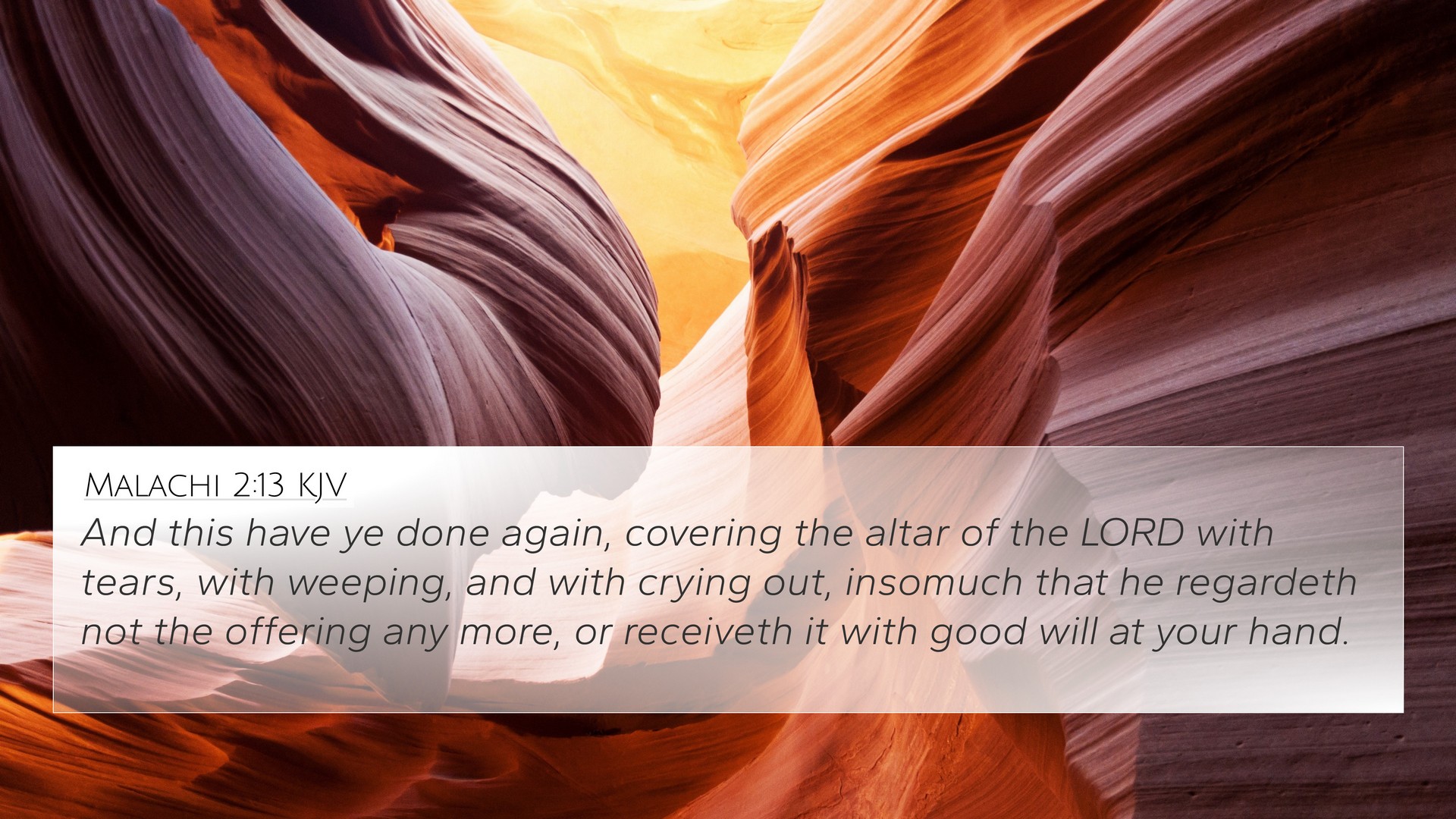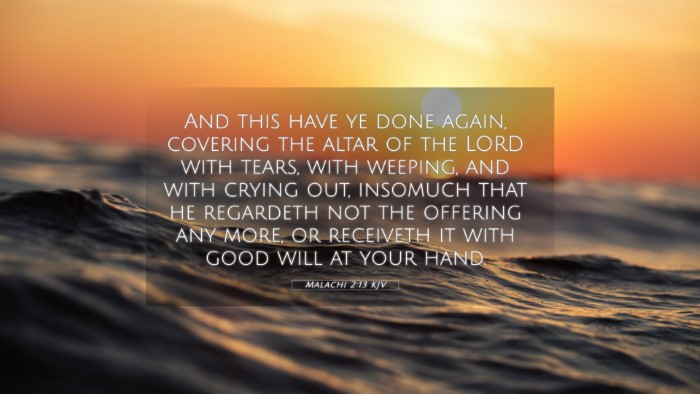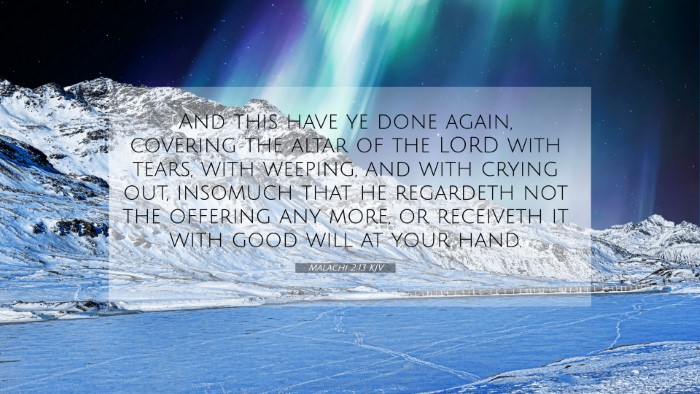Old Testament
Genesis Exodus Leviticus Numbers Deuteronomy Joshua Judges Ruth 1 Samuel 2 Samuel 1 Kings 2 Kings 1 Chronicles 2 Chronicles Ezra Nehemiah Esther Job Psalms Proverbs Ecclesiastes Song of Solomon Isaiah Jeremiah Lamentations Ezekiel Daniel Hosea Joel Amos Obadiah Jonah Micah Nahum Habakkuk Zephaniah Haggai Zechariah MalachiMalachi 2:13 Similar Verses
Malachi 2:13 Cross References
And this have ye done again, covering the altar of the LORD with tears, with weeping, and with crying out, insomuch that he regardeth not the offering any more, or receiveth it with good will at your hand.
Uncover the Rich Themes and Topics of This Bible Verse
Listed below are the Bible themes associated with Malachi 2:13. We invite you to explore each theme to gain deeper insights into the Scriptures.
Malachi 2:13 Cross Reference Verses
This section features a detailed cross-reference designed to enrich your understanding of the Scriptures. Below, you will find carefully selected verses that echo the themes and teachings related to Malachi 2:13 KJV. Click on any image to explore detailed analyses of related Bible verses and uncover deeper theological insights.
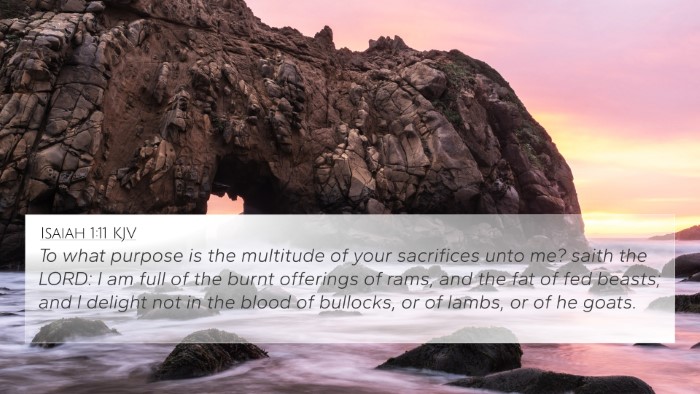
Isaiah 1:11 (KJV) »
To what purpose is the multitude of your sacrifices unto me? saith the LORD: I am full of the burnt offerings of rams, and the fat of fed beasts; and I delight not in the blood of bullocks, or of lambs, or of he goats.

Jeremiah 14:12 (KJV) »
When they fast, I will not hear their cry; and when they offer burnt offering and an oblation, I will not accept them: but I will consume them by the sword, and by the famine, and by the pestilence.
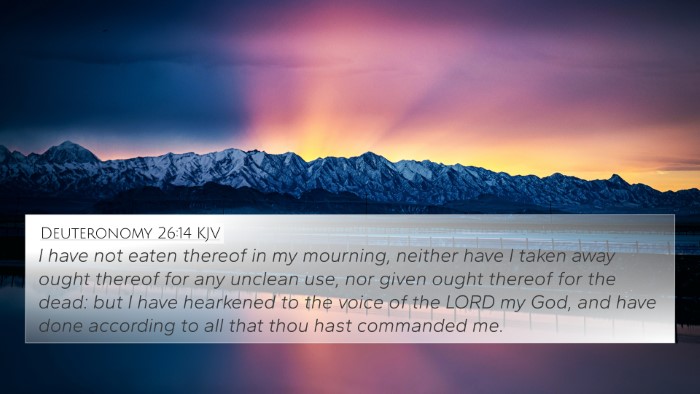
Deuteronomy 26:14 (KJV) »
I have not eaten thereof in my mourning, neither have I taken away ought thereof for any unclean use, nor given ought thereof for the dead: but I have hearkened to the voice of the LORD my God, and have done according to all that thou hast commanded me.
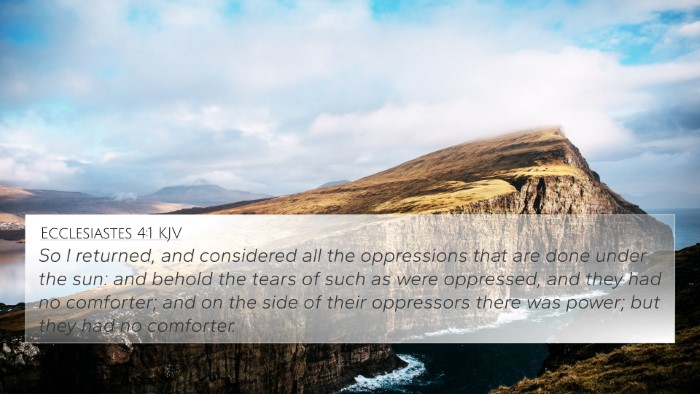
Ecclesiastes 4:1 (KJV) »
So I returned, and considered all the oppressions that are done under the sun: and behold the tears of such as were oppressed, and they had no comforter; and on the side of their oppressors there was power; but they had no comforter.
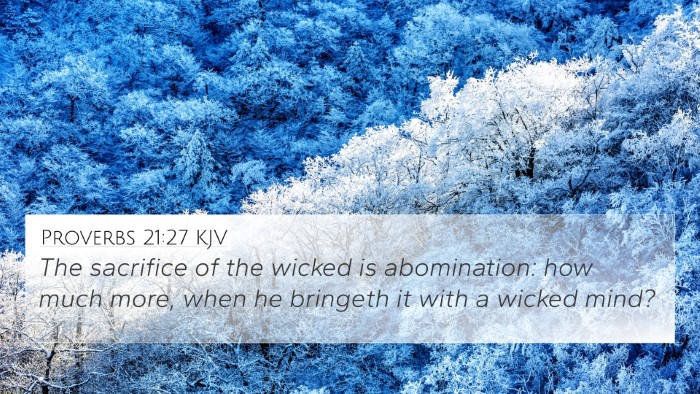
Proverbs 21:27 (KJV) »
The sacrifice of the wicked is abomination: how much more, when he bringeth it with a wicked mind?
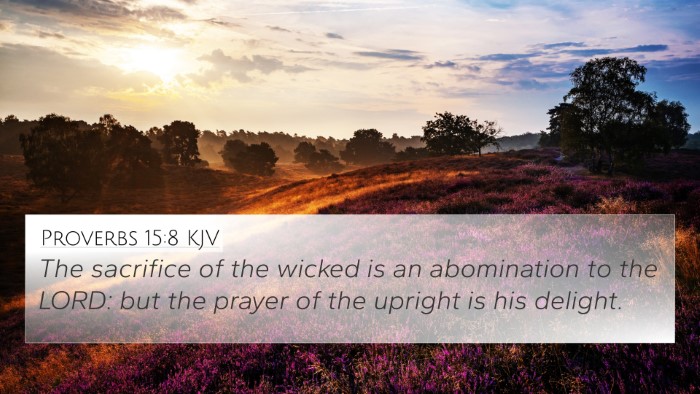
Proverbs 15:8 (KJV) »
The sacrifice of the wicked is an abomination to the LORD: but the prayer of the upright is his delight.
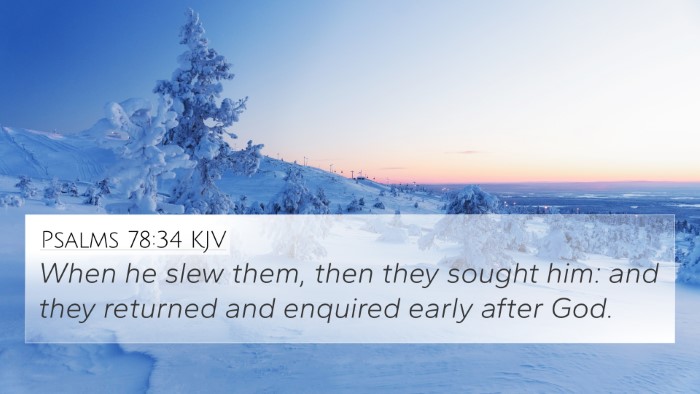
Psalms 78:34 (KJV) »
When he slew them, then they sought him: and they returned and enquired early after God.
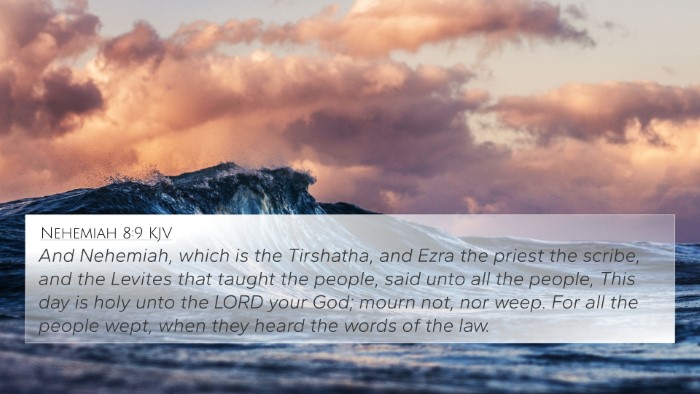
Nehemiah 8:9 (KJV) »
And Nehemiah, which is the Tirshatha, and Ezra the priest the scribe, and the Levites that taught the people, said unto all the people, This day is holy unto the LORD your God; mourn not, nor weep. For all the people wept, when they heard the words of the law.
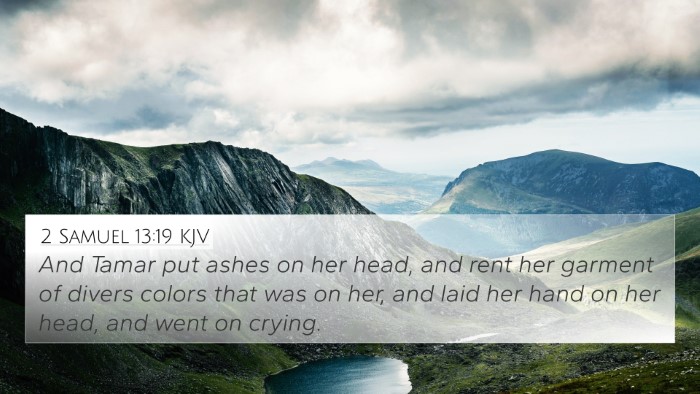
2 Samuel 13:19 (KJV) »
And Tamar put ashes on her head, and rent her garment of divers colors that was on her, and laid her hand on her head, and went on crying.
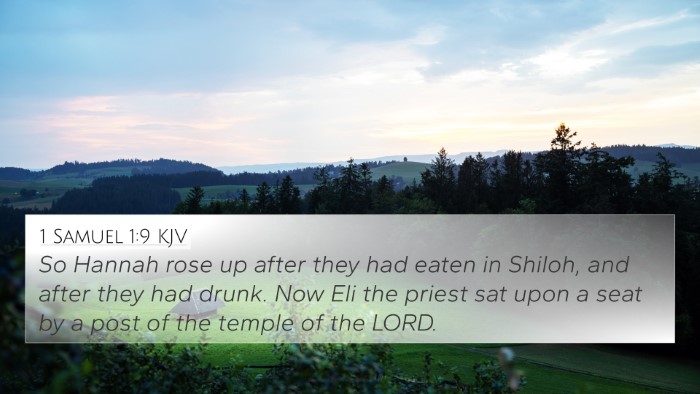
1 Samuel 1:9 (KJV) »
So Hannah rose up after they had eaten in Shiloh, and after they had drunk. Now Eli the priest sat upon a seat by a post of the temple of the LORD.
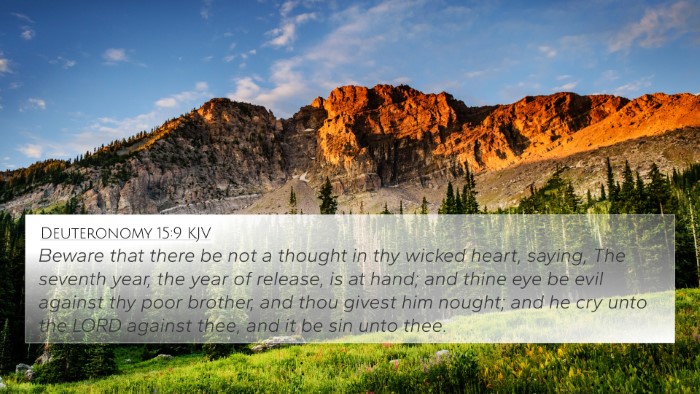
Deuteronomy 15:9 (KJV) »
Beware that there be not a thought in thy wicked heart, saying, The seventh year, the year of release, is at hand; and thine eye be evil against thy poor brother, and thou givest him nought; and he cry unto the LORD against thee, and it be sin unto thee.
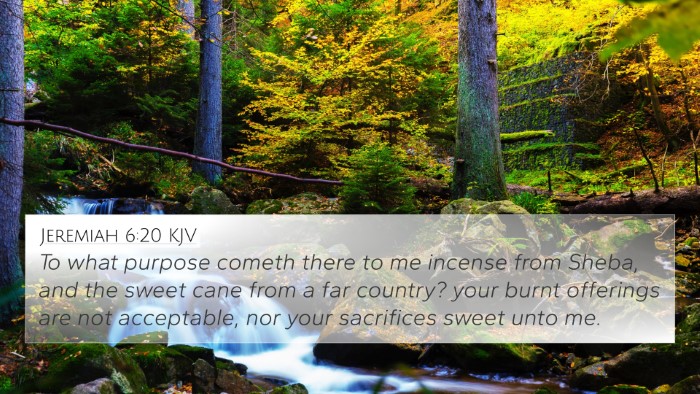
Jeremiah 6:20 (KJV) »
To what purpose cometh there to me incense from Sheba, and the sweet cane from a far country? your burnt offerings are not acceptable, nor your sacrifices sweet unto me.
Malachi 2:13 Verse Analysis and Similar Verses
Understanding Malachi 2:13
Malachi 2:13 states:
"And this is the second thing you do: You cover the altar of the Lord with tears, with weeping and crying; so He does not regard the offering anymore, nor receive it with goodwill from your hands."
Overview
In this verse, the prophet Malachi addresses the people of Israel regarding their insincere worship and the emptiness of their rituals. The act of covering the altar with tears signifies deep sorrow; however, God expresses that their mourning is not accepted due to their continued disobedience and wrongdoings.
Key Themes
- Insincere Worship: The emotional displays at the altar are noted, but God does not accept their offerings as their hearts are far from Him.
- Divine Displeasure: God’s refusal to regard their offerings reflects a serious message about the relationship between obedience and worship.
- Call to Repentance: The verse serves as a call for the people to examine their ways and align their actions with God’s desires.
Commentary Insights
Matthew Henry's Commentary
Matthew Henry emphasizes that the tears of the worshipers were not genuine based on their actions outside the temple. He states that their outward expressions of sorrow did not match their inward spiritual state. True repentance must be accompanied by a change in behavior.
Albert Barnes' Commentary
Albert Barnes notes that the emphasis is on the futility of ritualistic worship when not accompanied by righteousness. He highlights that God desires a true heart transformation rather than mere outward sorrow over sin. Barnes encourages believers to ensure that their devotion is genuine and that their lives reflect that commitment.
Adam Clarke's Commentary
Adam Clarke elaborates on the sociopolitical and religious context of Malachi’s time. He indicates that there was a general decline in spiritual integrity among the people. Clarke explains that the covering of the altar with tears symbolized a desperate appeal for God’s favor, but without sincere repentance, it was ineffectual. He advocates for authentic transformation and alignment with God’s will.
Bible Verse Cross-References
- Isaiah 1:15: "When you spread out your hands in prayer, I hide my eyes from you; even when you offer many prayers, I am not listening." - Reflects similar themes of insincere worship.
- Hosea 6:6: "For I desire mercy, not sacrifice, and acknowledgment of God rather than burnt offerings." - Highlights God's desire for a right heart.
- James 4:8: "Draw near to God, and He will draw near to you. Cleanse your hands, you sinners, and purify your hearts, you double-minded." - Calls for genuine repentance.
- Malachi 1:10: "Oh, that there were one among you who would shut the gates, that you might not uselessly kindle fire on My altar!" - A critique of insincerity in worship.
- Psalm 51:17: "The sacrifices of God are a broken spirit; a broken and contrite heart, O God, You will not despise." - Stresses the importance of sincerity in worship.
- Proverbs 15:8: "The sacrifice of the wicked is an abomination to the Lord, but the prayer of the upright is His delight." - Contrasts the heart behind offerings.
- Matthew 15:8: "These people honor Me with their lips, but their hearts are far from Me." - A direct reference to the disconnect between speech and reality in worship.
Thematic Bible Verse Connections
The connections between this verse and others throughout the Scriptures illustrate a recurring theme: God desires heartfelt worship rather than mere ritual. These Scriptures complement the practice of cross-referencing Biblical texts, bringing clarity to the consistent message about sincere devotion:
- Links between the Prophets and Apostolic teachings highlight the continuity of this theme.
- Cross-referencing Psalms with New Testament teachings shows the evolution of worship perspectives.
Conclusion
In summary, Malachi 2:13 serves as a critical reminder of the importance of authenticity in our relationship with God. It warns against the perils of empty rituals and calls for a genuine expression of faith.
